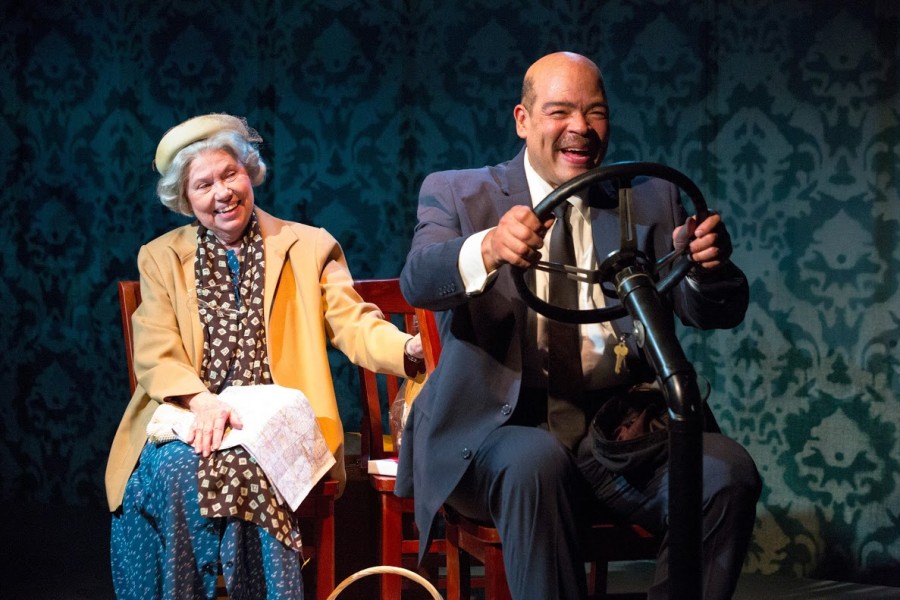
Driving Miss Daisy by Alfred Uhry. James J. Christy directed. Act II Playhouse, 2016.
Driving Miss Daisy is based on the actual family history of the playwright, Alfred Uhry. This production by Act II Playhouse captured that domestic feeling more than any I’ve ever attended.
The competition was daunting; just last year I saw Angela Lansbury and James Earl Jones, and most of us know Jessica Tandy and Morgan Freeman from the 1989 movie version. So what is it that lifts the new production to preeminence?
Part of it is the intimacy of the theater in the small town of Ambler; it is only nine rows deep. The other is the superlative acting of Carla Belver as the retired Jewish teacher Daisy Werthan, Brian Anthony Wilson as her black driver Hoke Colburn, and Tony Braithwaite as Daisy’s son Boolie. Their interpretations were soft-spoken, low-key and believable, rather than star turns, and they benefited from innovative staging by James J. Christy.
Surely Uhry’s family — originally from Atlanta and now living in New York — would love this production.
I have the pleasure of knowing the family, and I’ve spoken at length with Alfred about his background. Even though we share the Jewish religion, his life was far from my family’s experiences in Philadelphia.
Uhry’s maternal grandmother was Miss Daisy, actually named Lena, born in Atlanta in 1877. Alfred’s Uncle Sig was owner of a pencil factory which employed Leo Frank, a young Jewish relative from New York. When a local girl was found murdered in their warehouse in 1913, Frank was falsely accused and convicted of raping and killing her. He was suspect because he was an outsider, and particularly because he was a Jew. A cross-burning anti-Semitic mob dragged him from his cell and lynched him. (This became the subject of Uhry’s 1998 musical Parade.)
Alfred tells how his parents and other relatives were afraid to go out at night for years after the Frank lynching. They became as assimilated as possible, as if to avoid detection. They used no Sabbath candles, spoke no Hebrew or Yiddish, wore no yarmulkes. The Uhrys never had a Seder or a Bar Mitzvah.
His congregation was The Temple, founded by the German Jews of Atlanta. Eastern European Jews founded traditional Conservative and Orthodox synagogues but they were shunned by the German Reform Jews like the Uhry family. This strange hierarchy is referenced in the script and Christy insisted on using lines which have been cut by some other directors. When Daisy hears that someone bombed the Temple she says: “Well, it’s a mistake. I’m sure they meant to bomb one of the conservative synagogues or the orthodox one. The Temple is Reform; everybody knows that.”
Hoke responds: “A Jew is a Jew to them folks. Just like light or dark, we all the same nigger.”
The schism also is revealed when Miss Daisy wants to attend a 1964 dinner honoring Martin Luther King. Boolie prefers that neither he nor his mother go, for fear that white gentile Atlantans will hold it against them. He talks about the ways by which they will ostracize him and his business.
Some have viewed this play as sentimental nostalgia. Not so; it’s a bittersweet depiction of the problems faced by two minority groups over the course of 25 years in the Deep South.
It is no coincidence that the action begins in 1948, the year when liberal Democrats from the far North (such as Hubert Humphrey from Minnesota) first agitated at a national convention for Negro rights, and the Missouri-born Harry Truman expressed sympathy for the cause.
One of Christy’s innovations is adding a radio to let the audience hear music and news reports that reflect the periods and indicate the changes in the world.
Daisy is a strong-willed woman of 72 in 1948 and has crashed her car, so her son decides to hire a chauffeur to drive his mother around. He employs Hoke, a 60-year-old African-American man. Daisy resents Hoke’s presence, and each of them reveal racial and religious prejudices. Over the course of the next two decades Daisy gradually comes to appreciate him, and finally, at long last, to think of him as her best friend.
Boolie is dutiful to his mother, despite her prickly personality. When visiting her husband’s grave, Daisy notes that Boolie wants to pay the cemetery to handle the care of the gravesite; “Perpetual care they call it,” says Daisy, and then says sarcastically “Boolie will have me in perpetual care before I’m cold.”
The play reveals that Hoke doesn’t know how to read and one of the most touching scenes shows Miss Daisy giving him a lesson. Daisy and Hoke also bond around the fact that both had friends and relatives who were lynched.
Belver is a distinguished actress who was wonderful last year in The Glass Menagerie. Her performance here was even greater. We were touched as we saw her age before our eyes, her hands trembling, her face drooping as she turned 97 years old in 1973. Wilson was a tower of strength at the beginning and a hesitating man of 85 who had difficulty in walking during the last scene.
These physical changes were handled subtly, which is possible only a tiny space such as this theater. Braithwaite’s contribution was significant. He demonstrated patience and humor in dealing with his feisty mother, while guardedly showing his love by kissing her on the top of her head.
The sound by John Stovicek made a major contribution to this production, while the lighting by James Leitner and costumes by Frankie Fehr complemented it.
This review appeared first in Broad Street Review.